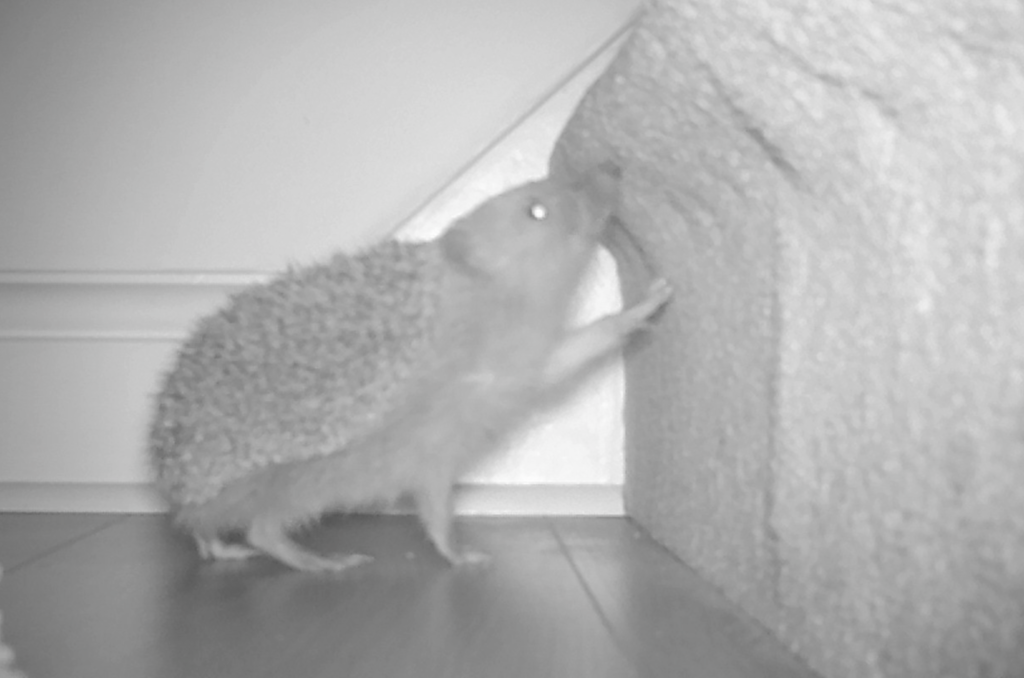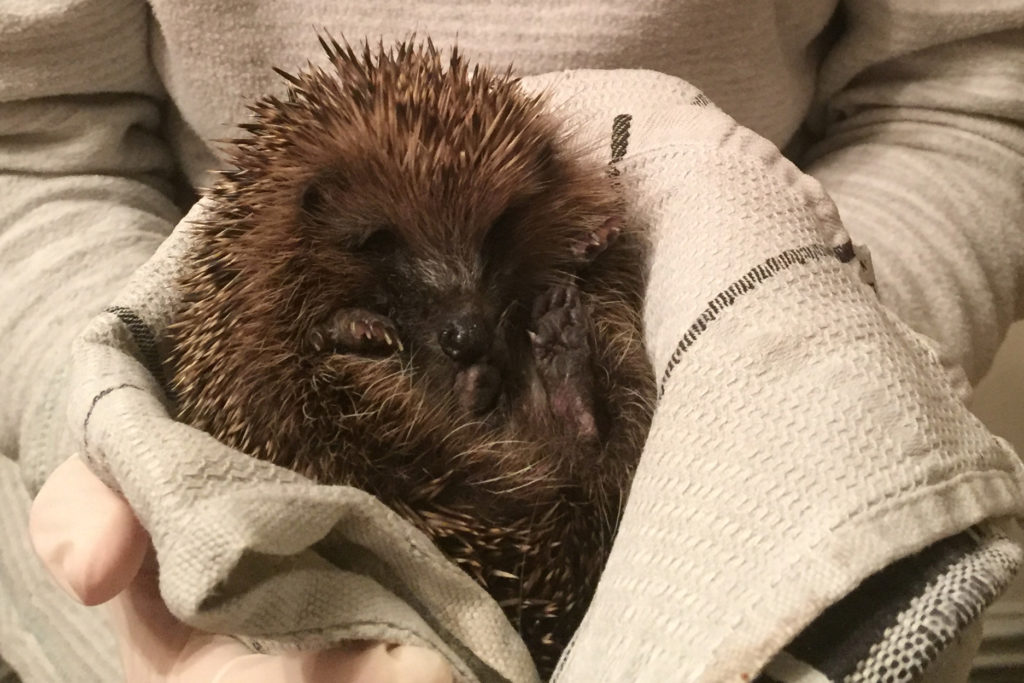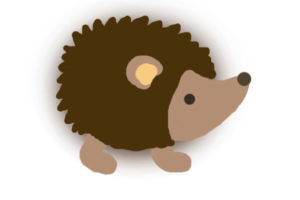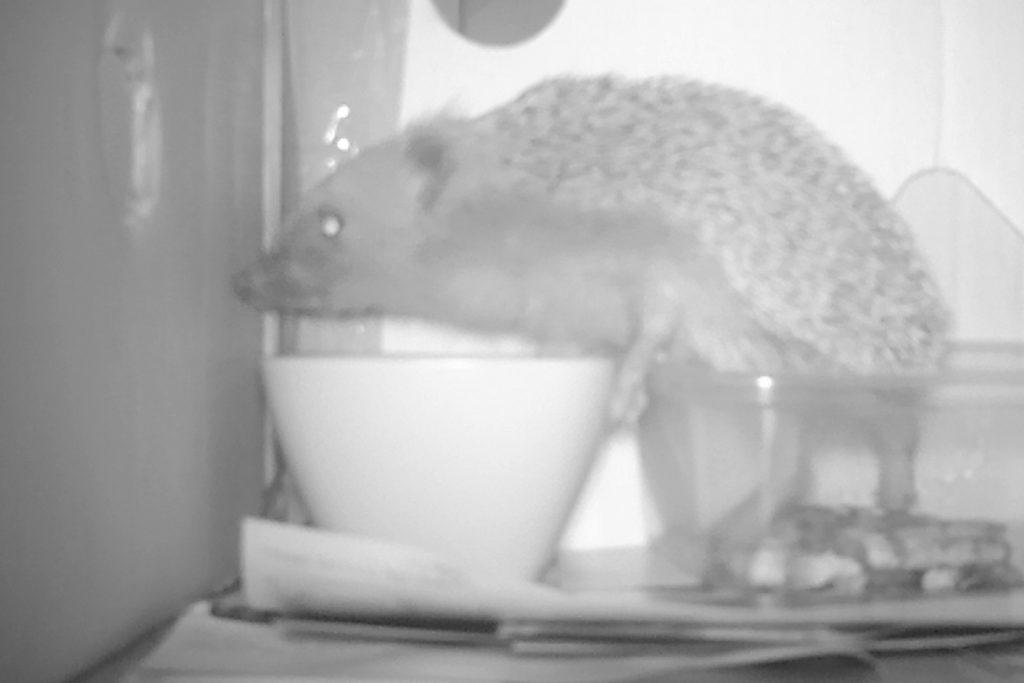We spent much of 2017 watching hedgehogs in the Embrace Nature UK garden and assumed that by December they would all be hibernating. Much to our surprise, a young hedgehog was rustling about in the leaf litter on the night of 9th December 2017 in freezing conditions. We were aware that this was unusual but were unsure about what to do. Therefore, we brought him into the house in a cardboard box and got tapping away on the computer.

We were unable to reach anyone who could give advice or help, so helped the hedgehog as much as we we able to. We already had hedgehog food and gave him water. On the first night he was keen to eat and drink and seemed in relative health as he escaped through the handles of the box and went walkabout in the kitchen. We surrounded him with tea towels to keep him as warm as we could and gave him a hot water bottle under the covers but were sure to take it out before it got cold.
Hedgehogs are very messy creatures and are not particular about where they leave their faeces. Therefore we changed his bedding every morning and night and coincided the bedding changes with a weigh-in and an opportunity for him to have a walk about. He would explore the hallway and had little trouble climbing the stairs. He did not seem to exhibit any of the issues associated with a poorly hedgehog that we read about on the internet. It wasn’t easy getting an accurate idea of his weight to begin with so it wasn’t until a few days after finding him that we realised he was losing weight.

Too much human contact can be stressful for hedgehogs so we built our guest a slightly more substantial area to sleep and walk about in out of cardboard boxes. After learning how strong a hedgehog’s front legs are, we were sure to make the sides impossible to reach so he couldn’t escape and come to any harm.
Around the time that we managed to reach a hedgehog expert, it was clear that the hedgehog was not well. We’d read about worms and lungworm being potential issues and booked in as soon as possible with a vet who was experienced with seeing and treating hedgehogs.
We referred to the hedgehog as Haim (meaning ‘life’) though sadly, after a week of living with us, he passed away at the vets after beginning worming treatment. This is not an unusual scenario and many autumn juveniles cannot build enough weight or strength to hibernate. Once brought indoors, there is a fine line between life and death as they are easily stressed and even nature can work against them; most commonly with parasites.
We learnt a lot from looking after Haim but sadly not enough to save his life. Had we have left him outside he’d certainly have died as the snow began to fall. We found information on the internet to be mostly limited to suggesting numbers to phone for advice. As no one answered our phone calls for most of the short week he was with us, we were left to use our initiative, which wasn’t enough to help.

Therefore, whilst we are not experts on this subject, we’ve decided to give a few pointers to anyone who finds a hedgehog out and about during Winter. For more information, seek advice from local animal rescue centres – some of which may have a 24 hour helpline. The information below is for the duration between finding a needy hedgehog and gaining professional advice.
 Not all hedgehogs feel the need to hibernate during milder Winters. If a hedgehog appears in good health and of a good weight in mild weather, it is probably fine and is best left undisturbed.
Not all hedgehogs feel the need to hibernate during milder Winters. If a hedgehog appears in good health and of a good weight in mild weather, it is probably fine and is best left undisturbed.
 If you find a hedgehog awake in very cold weather, it is underweight or appears to be in poor health, it is likely that it needs your help. Bring it indoors, give it plenty of bedding or towels and a hot water bottle or heat pad under the bedding. Allow the hedgehog space to move away from the warmth and remove hot water bottles before they get cold. Provide them with food and water.
If you find a hedgehog awake in very cold weather, it is underweight or appears to be in poor health, it is likely that it needs your help. Bring it indoors, give it plenty of bedding or towels and a hot water bottle or heat pad under the bedding. Allow the hedgehog space to move away from the warmth and remove hot water bottles before they get cold. Provide them with food and water.
 Contact a local animal rescue centre for advice. If you’re unable to reach them, call a veterinarian so you can combat potential health issues early on.
Contact a local animal rescue centre for advice. If you’re unable to reach them, call a veterinarian so you can combat potential health issues early on.
 Take a sample of the hedgehog’s faeces to take to the vets. This will help them to identify any problems so they can treat as appropriate.
Take a sample of the hedgehog’s faeces to take to the vets. This will help them to identify any problems so they can treat as appropriate.
 Try to keep noise and handling to a minimum with the hedgehog. The experience of being unwell or cold and then brought in to an unfamiliar location to begin with is probably quite stressful enough so too much noise or handling can exacerbate the problem.
Try to keep noise and handling to a minimum with the hedgehog. The experience of being unwell or cold and then brought in to an unfamiliar location to begin with is probably quite stressful enough so too much noise or handling can exacerbate the problem.
 Weigh the hedgehog if you’re able and confident enough to. We found that a flat electronic kitchen scale with a bowl on top worked best. I would pick up Haim gently with gloves on and a tea towel then rest him in the bowl to take his weight before placing him back with the tea towel. It was the weight loss that prompted experts to suggest a vet and get Haim treated.
Weigh the hedgehog if you’re able and confident enough to. We found that a flat electronic kitchen scale with a bowl on top worked best. I would pick up Haim gently with gloves on and a tea towel then rest him in the bowl to take his weight before placing him back with the tea towel. It was the weight loss that prompted experts to suggest a vet and get Haim treated.
 Vary the hedgehog’s diet. Hedgehogs love meal worms but they’re not nutritious and can cause hedgehogs to refuse other food. A few meal worms are good for a treat, but here are examples of other foods and drinks that you can offer a hedgehog:
Vary the hedgehog’s diet. Hedgehogs love meal worms but they’re not nutritious and can cause hedgehogs to refuse other food. A few meal worms are good for a treat, but here are examples of other foods and drinks that you can offer a hedgehog:
Scrambled or boiled eggs
Raw or cooked meat and chicken
Chicken in jelly (mash with a fork to make it easier to eat)
Very small amounts of plain cake or biscuit
Cat biscuits (chicken mixture is arguably best)
Hedgehog food
Water (it’s important to give the hedgehog a dish with water in so they can drink as they please)
Lactose-free milk (warm it up and check it with your finger to make sure it’s not too hot)

 Do not overwhelm the hedgehog with too much food as they don’t eat very much normally. Do not take creatures from the garden to feed the hedgehog as this can make the hedgehog unwell.
Do not overwhelm the hedgehog with too much food as they don’t eat very much normally. Do not take creatures from the garden to feed the hedgehog as this can make the hedgehog unwell.
 Put food in a container that the hedgehog can easily eat out of but that doesn’t rattle when they touch it. Sound can put hedgehogs off of eating so the quieter everything is, the better.
Put food in a container that the hedgehog can easily eat out of but that doesn’t rattle when they touch it. Sound can put hedgehogs off of eating so the quieter everything is, the better.
It’s important to remember that the hedgehog might not make it and not to blame yourself if it doesn’t. Do the best that you can to help and get the hedgehog to an expert as soon as you can. If it doesn’t make it through, at least it will likely have died in a more comfortable setting than it might otherwise have done if left alone in the cold. Use sources available to you to make the most appropriate judgement as to whether a hedgehog needs help before taking it from the wild.
Even if you’re not looking after a hedgehog that requires your assistance, it is helpful if you put out food and water for any hedgehogs that decide to stay awake throughout the Winter.
